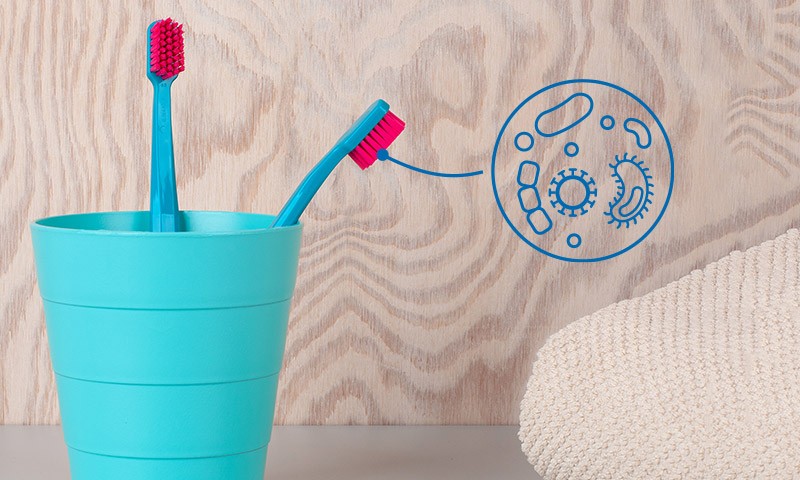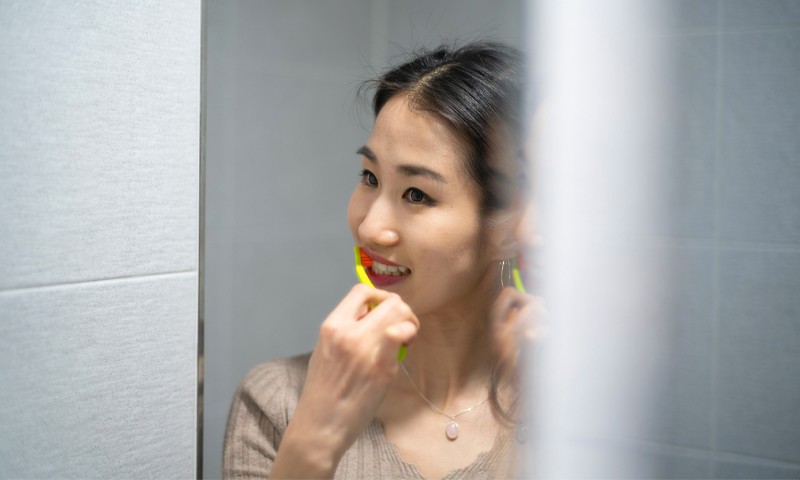Why this guide?
Teeth and gums in pregnancy
We created this ultimate guide because:
- Looking after your oral health is more difficult during pregnancy
- We can help you to keep your mouth healthy… by showing you the right techniques and the most effective products
Four things every mum-to-be needs to know
Sore gums during pregnancy
Does pregnancy affect dental health?
Changes in your hormones can make you more susceptible to a build-up of plaque on your teeth.
This can lead to sore and swollen gums, which may bleed more easily… which could mean you have gingivitis – an early stage of gum disease. Gingivitis, if left untreated can lead to periodontitis – when the tissues that hold in place and support the teeth become inflamed. When not treated, periodontitis can lead to tooth loss.
How can I take care of my gums during pregnancy?
Fortunately a consistent, high-quality daily oral health routine can help you to deal with or prevent sore gums, gingivitis and the risk of periodontitis.
So keep reading!
As always, looking after your teeth and gums benefits your whole body – including your arteries, heart and brain.
Tooth decay and pregnancy
Because you’re more vulnerable to dental plaque, you’re also at greater risk of tooth decay – when plaque turns sugars into enamel-attacking acid.
How to treat tooth decay during pregnancy
If you have any concerns about tooth decay, please ask your dentist.
But the best way to ward off tooth decay… is to be consistent with a great oral health routine.
Pregnancy cravings & oral healt
For many pregnant women, cravings start in the first trimester – as early as five weeks into pregnancy – and get stronger in the second trimester.
If you crave acidic or sweet food or drink you need to take special care. The acidity of things like cola, orange juice, fruit and sugary sweets attack the structure of tooth enamel.
Don't brush straight away
If possible, try not to eat or drink too many of these treats! When you do, take a sip of water straight afterwards.
And make sure you wait at least half an hour before brushing – your teeth enamel becomes weaker and more at risk of damage straight after consuming acidic food and drink.
Morning sickness & your teeth
Similarly, with the nausea and vomiting common in pregnancy – often known as morning sickness – the acid in your vomit can damage your teeth enamel.
Rinse your mouth with water after being sick and wait at least half an hour before brushing.
Dental care while pregnant
Definitely go and see your dentist at least once during your pregnancy. As discussed, your oral health needs are greater when you’re pregnant.
Do I need to tell my dentist I’m pregnant?
Definitely tell your dentist you’re pregnant as this may affect your dental care…
Dental fillings during pregnancy
For example, some guidelines suggest removing or replacing amalgam fillings should be delayed until after you’ve had your baby.
And dental X-rays should usually be avoided.
If you have any concerns at all about your teeth and gums, don’t hesitate to go and see a dental professional.
The best routine
The ultimate oral health routine
The best foundation to keep your teeth and gums healthy and help prevent the dental problems associated with pregnancy is to:
- Brush your teeth with the right technique twice a day…
- Clean the spaces in between your teeth with interdental brushes
IMPORTANT: Expectant mums can feel pretty tired by the evening time. It can be tempting to skip parts of your oral health routine at night but please remember – staying consistent is even more important during pregnancy.
Step one
Brushing your teeth
Brush your teeth the right eay with a gentle toothbrush during pregnancy
Because gums are soft and even more sensitive during pregnancy, it’s important to clean them gently.
That’s why our iconic Curaprox CS 5460 toothbrush features 5,460 ultra-fine, gentle Curen® filaments, densely-packed on the compact brush head.
This gives you gentle but exceptional power…
… to clean the teeth and the gumline without causing any injury.
That’s why the CS 5460, developed and manufactured in Switzerland, is recommended by dental professionals.
- The compact brush head finds all the hard-to-reach-spots
- The octagonal handle guides you to clean your teeth at the correct angle
- It’s relentless on plaque and preventing enamel damage…
- … and relentlessly gentle on your teeth and gums
- It looks beautiful… and is now available in 36 colour combinations – and further limited and special editions.
How to brush your teeth with the CS 5460
The quick version:
- Tilt the brush at a 45 degree angle – half on the tooth, half on the gums.
- Move in small, gentle circles – almost without any pressure.
We recommend using the CS 5460 with gentle, mild and effective Curaprox Enzycal toothpastes with fluoride.
As you know by now, you’re more susceptible to tooth decay during pregnancy.
Sodium fluoride strengthens your tooth enamel and, after brushing, makes it resistant to acid attacks. It also remineralises the enamel, including areas that have come under attack… and minimises the growth of the harmful bacteria that can lead to tooth decay.
Curaprox Enzycal toothpastes:
- Taste fresh
- Fight tooth decay
- Are gentle on the oral mucosa – the tissue that lines the mouth
- Only use ingredients that work naturally with your body…
- … such as enzymes to boost the protective power of your saliva and your natural immune system
- Eliminate nasty ingredients such as SLS, Triclosan and plastic microbeads
- Help you to enjoy the best oral health – delivered in the gentlest way
Step two
Interdental care
Clean the spaces between your teeth with interdental brushes
Failing to clean the spaces between the teeth is a major health risk for anyone.
Using Curaprox CPS prime interdental brushes – as well as brushing with the best toothbrush and toothpaste – helps you to deal with or prevent gingivitis… and therefore the further risk of periodontitis.
Toothbrushes can’t get into the tiny spaces between the teeth, which – without interdental cleaning – are the perfect breeding ground for plaque to hide and grow…
… and infect your gums.
Curaprox CPS prime interdental brushes give you exceptional cleanliness in those difficult-to-reach narrow spaces…
… thanks to super-fine, extra-long, ultra-resilient filaments. This is gentle and effective cleaning with a single-brush action. Once a day.
And our interdental brush refill system helps to reduce plastic waste.
How to use CPS prime interdental brushes
The quick version:
Every evening before or after brushing…
For each interdental space: Once in and out. Rinse your brush. Move on to the next space.
Many people notice some bleeding the first time they use interdental brushes, which indicates inflammation. Continue to use them every day. After a week, the inflammation and any bleeding should subside. If not, please ask your dentist for advice.
Please also ask a dental professional to help you to work out the best sizes of interdental brush for you. If a brush is too small, it won’t clean properly while, if it’s too big, it won’t fit and it could hurt your gums.
 Swiss premium oral care
Swiss premium oral care


















